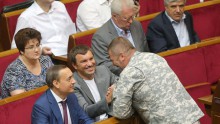Watching the voting for amendments to the Constitution on August 31, listening to MPs at the rostrum with their sad or bombastic speeches the following day, and glimpsing some grinning in the lobby, I remembered the days of Maidan. The stage on Maidan, endless speeches, blood on the streets, and Donbas, roused into the state of rabid aggression. And at the same time, misplaced grins on the lips of some individuals who looked as if they knew something, or did not fully realize what was going on around. And it looks like those grins are still lingering on many faces. The bombastic words, too, are still echoing under the dome of the Rada.
On the last summer day, while outside the Rada grenades and smoke bombs were flying, inside the opponents of the amendments were making a terrible din, the speaker of the parliament wore a different grimace with each new orator appearing at the rostrum, and the Opposition Bloc representatives exchanged sly grins in private conversations. The amendments to the Constitution turned out nothing but a pretext for another feast of populism, where everything was planned beforehand. On the next day, the day of mourning, such suggestive grins were to be seen also on the faces of MPs from other factions and parties. Gaming in parliament turned into a toxic substance, and society apparently had an overdose of it. After all, three killed National Guards and the wounded policemen became materialized proof of that overdose. The first proof, mind you.
One can spin conspiracy theories and ponder on the involvement of special services in the tragedy, or look for those who should profit as far as the Kremlin. But one question remains: how did people perceive this tragedy, and did the “servants of the people” learn their lesson after it? Indeed, a live discussion was sparked in society. Let’s give Ukrainians their due: they mostly realize the inadmissibility of aggression in any situation. Notwithstanding lots of speculations, so far society has been holding a dialog, which still could turn into a confrontation at a certain moment. It can be triggered by objective dissatisfaction of citizens or by deliberate manipulations with information on the part of political groups. And it is not only true of provocative statements, but also of seemingly wise and sensible speeches, with ostentatious preoccupation with peace and harmony, but absolutely unfounded.
MP Yurii Bereza warned from the parliament’s podium: “Yesterday, three of our comrades in arms were killed outside Ukraine’s parliament. Three National Guards, who were performing their duty. You know, over the past year and a half I have buried a lot of people, but they all were killed in the east, they died from enemy’s bullets. Tell me, whose bullets killed these three young men? Why, in my country, are boys dying of political intrigues today? Why, in my country, are boys dying for each of us, defending democracy outside the Ukrainian parliament? I do not know, I really do not know how I can look their mothers in the eye. How can I explain to them why their children died, and not in the east, but in Kyiv, in the center of the capital? That is why I urge you, colleagues, friends, comrades-in-arms: we must put an end to these incomprehensible relations. If we do not draw conclusions now, we will repeat 1917; if we do not unite now, we will forfeit this state. And there will be no acquittal for us while we live and after we die. Neither God nor people will forgive us.”
On the day after the tragedy, the policy makers’ pretty, correct speeches, urging to seek consolidation and avoid the repetition of 1917, were in discord with the general elation further from the podium. As if the rostrum on the podium still was a stage with actors, directors, spectators, and the scenes. The MPs invoked 1917, which suggests certain associations. We remember that the February revolution of 1917 was followed by the October revolution. The election campaign in late October this year has every chance to turn into another test of the public’s nerve. This is especially true in the conditions of the abovementioned overdose of manipulations, deep disillusionment, fatigue and, maybe, a detail that for some is absolutely insignificant: public utilities bills. This last moment could justify any radical actions in the eyes of the population, fed up with electoral promises, which even past year caused revulsion with their primitive triteness. An average Ukrainian’s income is inversely proportional to the ever growing spending, which can leave behind the frozen “evolution” of parliamentarism. This parliamentarism still remains a set of projects, and not ideas, the buzz of intrigues, not a dialog with society. And then, speeches will not help. In a fight between the fridge and the television set, as our recent experience shows, the grenade is the winner. And there will be some who will want to profit by it.
The smiles on the lips of the MPs mean that the political groups are now satisfied with the distribution of seats and the political dividends, which the reformatting of the coalition has brought. The projects, ready for the start of local elections, anticipate the months to come. But the formal statements mourning the men killed a dozen meters away from the entrance to the parliament building do not show that the MPs realize the degree of danger. Intoxicated by electioneering, they will cash in even on death, oblivious to the fact that trouble has never been so close to the government’s block since the end of Maidan. This fact should at least make them adjust their countenances.








